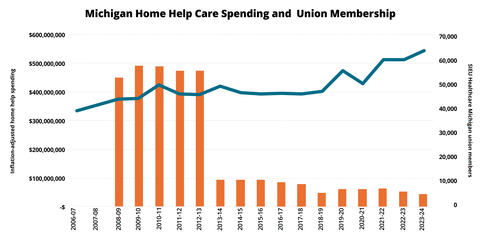As union membership plummets, home help care spending in Michigan has skyrocketed
Ten years after SEIU scheme came to an end, spending is up 85%
Payments to home health aides have increased 85% since 10 years ago, even though union membership is down dramatically.
For several years earlier this century, the Service Employees International Union collected more than $34 million in what the Mackinac Center and other critics dubbed a “dues skim.” The SEIU took money from people who were helping the disabled — often, their own relatives — at home and receiving payments from Medicaid for their services. The Mackinac Center objected to the union arrangement by filing a complaint with the Michigan Employment Relations Commission. Rick Snyder, Michigan’s governor in 2012, signed legislation to put an end to the scheme, which had involved a dummy employer against which the SEIU would bargain for payments, and caregivers not knowing they were paying the union.
Payments for the home health aide program have increased since then, despite caregivers not paying the SEIU. In the 2012-13 fiscal year the Legislature appropriated $292 million for home health services. By 2020, those payments were $392.2 million, and they reached $540.9 million in the 2023-24 budget. In the 10 years since the dues skim ended, spending went up by 85%, before inflation.
It’s possible that home health aides will once again be forced to pay union dues. That’s thanks to Senate Bill 790, introduced by Sen. Kevin Hertel, D-St. Clair Shores, and SB 791, introduced by Sylvia Santana, D-Detroit.
CapCon reported on the legislation in March.
If a union returns, it may not lead to higher payments for aides. Policymakers, not unions, determine the compensation of home health workers, said Steve Delie, director of the Mackinac Center’s labor policy efforts, and Patrick Wright, its vice president for legal affairs. They wrote in a commentary:
“In theory, a union is supposed to bargain on behalf of employees in order to secure better terms and conditions of employment. But in this case the union can’t really do so — funding for home healthcare workers is set at the federal level and the disbursement of these funds has to be approved by the Michigan Legislature.”
Michigan Capitol Confidential is the news source produced by the Mackinac Center for Public Policy. Michigan Capitol Confidential reports with a free-market news perspective.


